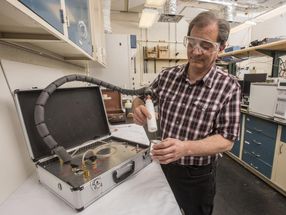Caffeine and its analogues revert memory deficits by normalizing stress responses in the brain
A study describes the mechanism by which caffeine counteracts age-related cognitive deficits in animals.

Alexas_Photos; pixabay.com; CC0
The study coordinated by Portuguese researchers from Instituto de Medicina Molecular (iMM Lisboa) and collaborators from Inserm in Lille, France, along with teams from Germany and United States, showed that the abnormalexpression of a particular receptor - the adenosine A2A, target for caffeine - in the brain of rats induces an aging-like profile namely memory impairments linked to the loss of stress controlling mechanisms.
"This is part of a larger study initiated 4 years ago in which we identified the role of this receptor in stress, but we did not know whether its activation would be sufficient to trigger all the changes. We now found that by altering the amount of this receptor alone in neurons from hippocampus and cortex - memory related areas - is sufficient to induce a profile that we designate as 'early-aging' combining the memory loss and an increase in stress hormones in plasma (cortisol)" - explains Luisa Lopes, Group Leader at iMM Lisboa and the coordinator of the study.
When the same animals were treated with a caffeine analogue, which blocks the action of adenosine A2A receptors, both memory and stress related deficits were normalized.
David Blum, from Inserm research director, adds: "In elderly people, we know there is an increase of stress hormones that have an impact on memory. Our work supports the view that the procognitive effects of A2AR antagonists, namely caffeine, observed in Alzheimer's and age-related cognitive impairments may rely on this ability to counteract the loss of stress controlling mechanisms that occurs upon aging"
This is important not only to understand the fundamental changes that occur upon aging, but it also identifies the dysfunctions of the adenosine A2A receptor as a key player in triggering these changes. And a very appealing therapeutic target" - concludes Luisa Lopes.
Original publication
Other news from the department science

Get the life science industry in your inbox
From now on, don't miss a thing: Our newsletter for biotechnology, pharma and life sciences brings you up to date every Tuesday and Thursday. The latest industry news, product highlights and innovations - compact and easy to understand in your inbox. Researched by us so you don't have to.




















































